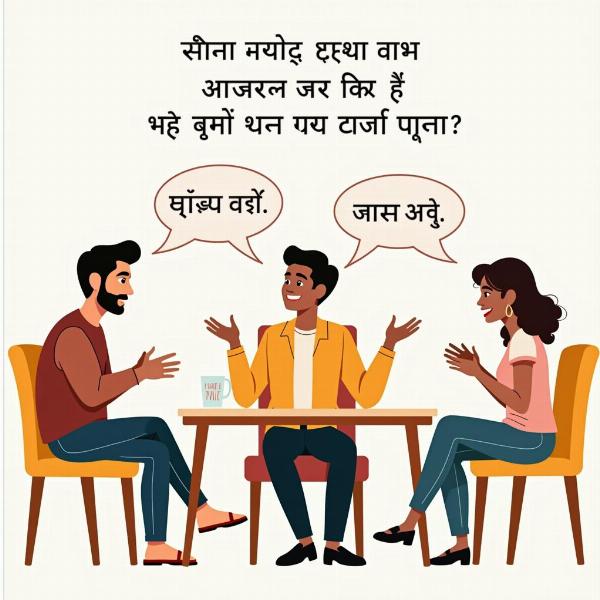Understanding how to ask questions in Hindi is crucial for effective communication. While a direct translation of “I ask you something” might not always capture the nuance of Hindi, this article will explore various ways to express this sentiment, ensuring you can confidently pose questions in different contexts. We’ll cover common phrases, grammatical structures, and cultural considerations, providing you with the tools to navigate conversations with ease.
Different Ways to Say “I Ask You Something” in Hindi
Several Hindi phrases convey the meaning of “I ask you something,” each with its own level of formality and politeness. Let’s delve into some common options:
- मैं आपसे कुछ पूछना चाहता/चाहती हूँ (Main aapse kuchh poochhna chahta/chahti hun): This is a polite and formal way to say “I want to ask you something.” The word chahta is used by males, while chahti is used by females. This phrasing is suitable for addressing elders, superiors, or strangers.
- क्या मैं आपसे कुछ पूछ सकता/सकती हूँ? (Kya main aapse kuchh poochh sakta/sakti hun?): Translating to “May I ask you something?”, this is a more formal and respectful way to initiate a question. Again, sakta is for males and sakti is for females.
- एक बात पूछूँ? (Ek baat poochun?): This informal phrase translates to “Can I ask a question?” and is suitable for use with friends and family.
- जरा एक बात पूछूँ? (Zara ek baat poochun?): Adding zara adds a touch of politeness to the informal phrase, making it suitable for acquaintances or colleagues.
- पूछूँ कुछ? (Poochun kuchh?): This is a very informal and abbreviated way of asking “Can I ask something?” Best used with close friends and family.
 Asking Questions in Hindi
Asking Questions in Hindi
Grammatical Structures for Asking Questions in Hindi
Hindi uses interrogative pronouns like क्या (kya – what), कौन (kaun – who), कहाँ (kahan – where), कब (kab – when), कैसे (kaise – how), and क्यों (kyon – why) to form questions. The word order often changes in a question, with the interrogative pronoun usually placed at the beginning or end of the sentence.
Cultural Considerations When Asking Questions in Hindi
Respect for elders is paramount in Indian culture. When addressing elders, it’s crucial to use polite and respectful language. Avoid direct or blunt questions and opt for more indirect phrasing. Using appropriate honorifics like जी (ji) and साहब/साहिबा (sahab/sahiba) is also important.
What is the most polite way to ask a question in Hindi?
The most polite way to ask a question is typically using “क्या मैं आपसे कुछ पूछ सकता/सकती हूँ? (Kya main aapse kuchh poochh sakta/sakti hun?)” as it shows deference and respect.
Can I use English words when asking a question in Hindi?
While some English words have become common in Hindi conversations, it’s generally best to avoid mixing languages, especially when addressing elders or in formal settings.
Can “I ask you something” be translated literally into Hindi?
While a literal translation is possible, it might sound unnatural or even rude in certain contexts. Using the phrases provided earlier offers a more natural and culturally appropriate way to express this sentiment.
How do I ask for clarification in Hindi?
You can use phrases like “क्या आप इसे दोहरा सकते हैं? (Kya aap ise dohrana sakte hain?)” meaning “Could you repeat that?” or “मुझे समझ नहीं आया (Mujhe samajh nahi aaya)” meaning “I didn’t understand.”
Conclusion
Mastering the art of asking questions in Hindi involves understanding not only the literal translations but also the cultural nuances and appropriate levels of formality. By utilizing the various phrases and grammatical structures outlined in this article, you can confidently navigate conversations and build stronger connections with Hindi speakers. Remember to always be mindful of respect and politeness, especially when addressing elders. Utilizing the correct phrasing can significantly enhance your communication and cultural understanding.
FAQs
- How do I say “I have a question” in Hindi? You can say “मेरा एक सवाल है (Mera ek sawal hai).”
- What is the difference between पूछना (poochhna) and पूछना चाहता हूँ (poochhna chahta hun)? पूछना (poochhna) means “to ask,” while पूछना चाहता हूँ (poochhna chahta hun) means “I want to ask.” The latter is more polite and formal.
- Is it okay to ask personal questions in Hindi? As with any culture, avoid asking overly personal questions, especially when first meeting someone.
- How do I respond if I don’t know the answer to a question in Hindi? You can politely say “मुझे नहीं पता (Mujhe nahin pata)” meaning “I don’t know.”
- Where can I learn more about Hindi grammar? Many online resources and textbooks are available to help you further your Hindi language learning.
- What are some common mistakes to avoid when asking questions in Hindi? Avoid using direct translations and be mindful of politeness levels.
- How important is tone of voice when asking questions in Hindi? Tone of voice plays a significant role, as it can convey respect, politeness, or informality.
Meaning-Hindi.in is your trusted partner for all your Hindi translation needs. We specialize in various translation services, including business and commercial documents, legal and certified translations, technical manuals, website localization, and educational materials. Our team of expert Hindi linguists ensures accurate and culturally sensitive translations. Contact us today for a free quote at [email protected] or call us at +91 11-4502-7584. Meaning-Hindi.in is committed to bridging the language gap and facilitating seamless communication.